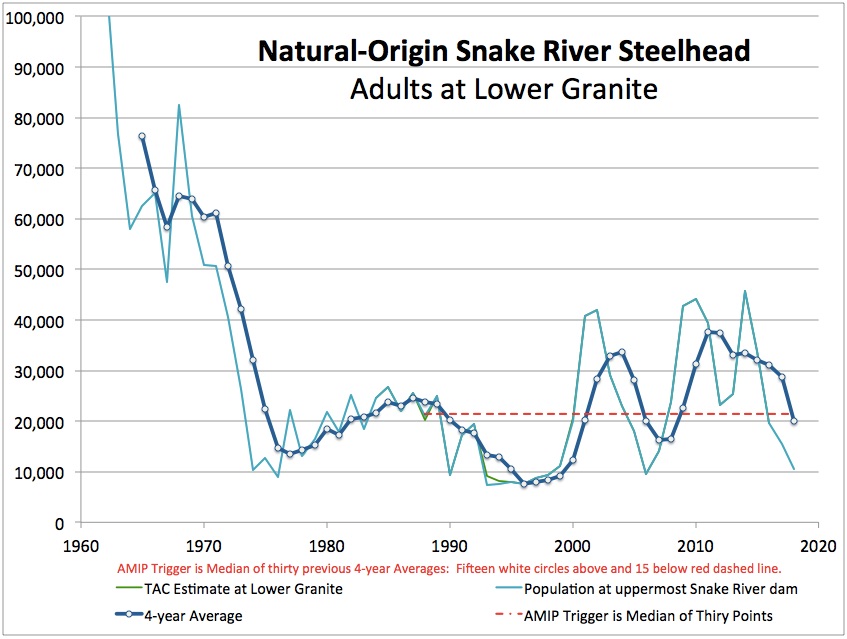forum
library
tutorial
contact

Salmon, Dams Study
Comment Period Nears End
by Eric Barker
Lewiston Tribune, April 5, 2020
|
the film forum library tutorial contact |

|
Salmon, Dams Study
by Eric Barker
|
Critics say coronavirus stay-home orders interfered with proper feedback on lengthy document
 Representatives from the Army Corps of Engineers and its sister agencies say they are satisfied with the improvised public comment period on a landmark salmon and dams study, despite it occurring during a national public health emergency.
Representatives from the Army Corps of Engineers and its sister agencies say they are satisfied with the improvised public comment period on a landmark salmon and dams study, despite it occurring during a national public health emergency.
The Corps, U.S. Bureau of Reclamation and the Bonneville Power Administration are set to wrap up the 45-day comment period on the document April 13, but critics say the process is compromised by the response to the coronavirus and should be extended.
The Columbia River Systems Operation Review Draft Environmental Impact Statement spells out a strategy meant to balance the needs of endangered fish with operation of dams on the Snake and Columbia rivers.
The nearly 8,000-page document recommends tweaking existing efforts centered on spilling water at the dams as the preferred course of action to help salmon and steelhead. The study included an alternative that looked at breaching the four lower Snake River dams, but dismissed it as too costly.
The agencies wrapped up a schedule of six public meetings that were to be held in locations throughout the basin last month, but instead were held as teleconference calls to comply with social distancing strategies and stay-home orders associated with the coronavirus pandemic.
More than 1,000 people called into the meetings, and about 300 made comments. In addition, the agencies have received 2,200 written comments so far.
"I think generally the team is pleased with the response we have received, both on the teleconferences and the written and online comments, and it does not look like we will be extending the comment period," said Matt Rabe, a spokesman for the Corps at Portland.
Several groups and individuals have asked that the comment period be extended because of the ongoing coronavirus crisis and because of the extreme length of the document. Those seeking an extension include 13 members of Congress from Oregon and Washington who recently sent a letter to White House Council on Environmental Quality Chairwoman Mary Neumayr, asking her to extend the comment period until 30 days after the COVID-19 health crisis has passed
The group, all Democrats, includes U.S. Sens. Maria Cantwell and Patty Murray of Washington and Ron Wyden and Jeff Merkley of Oregon, as well as several members of the House.
"The current crisis cannot plausibly provide for an environment conducive to robust public comment," they wrote. "Public feedback should be solicited in an accessible manner and, crucially, in-person, so that the citizens who stand to be affected most directly can make their voices heard to the officials charged with making these decisions."
Congresswoman Cathy McMorris Rodgers, a Republican representing eastern Washington, sees it differently, and believes the yearslong process to craft the EIS needs to wrap up.
"Especially during the economic crisis caused by this pandemic, people need certainty that our dams, the jobs they support, and the clean, affordable energy they produce, are protected," said her spokesman, Jared Powell.
Members of Idaho's congressional delegation, all Republicans, are split on extending the comment period.
"We feel an extension is reasonable," said Lindsay Nothern, a spokesman for Sen. Mike Crapo. "We've heard from a lot of Idahoans about it."
Sen. Jim Risch and Rep. Russ Fulcher don't want to see an extension.
"In total, this process has been underway for three years. It is difficult to see how adding an extension to the comment period will add any value to this conversation," Fulcher said.
Risch said he believes the agencies have adapted well to the unexpected challenges of not being able to hold in-person meetings.
"The Corps is setting the standard for how other government agencies can continue serving the American people under social-distancing limitations. Sen. Risch is confident in their efforts to reach constituents, as well as their ability to complete this process on schedule," said his press secretary, Marty Cozza.
Meanwhile, citizens wishing to comment have a little more than a week to do so.
Shortly after the draft was released at the end of February, a group of former Idaho Fish and Game commissioners from Lewiston petitioned Gov. Brad Little to ask for an extension to the comment period. At the time, the group made the request based simply on the length and complexity of the study. Since then, they said, the pandemic has distracted people from reading what was already a difficult document.
"It's obviously taking the air out of the room for getting everybody interested in the (draft EIS)," said Keith Carlson, of Lewiston.
The former commissioners sent their comments, in which they say only the dam breaching alternative promises to boost survival enough for the fish to recover, to the Idaho Office of Species Conservation in an effort to help shape the state's official response.
"We don't have tremendous hope of influencing the Corps," Carlson said. "I do think there is some hope of getting Gov. Little to come up with some Idaho comments. If we can influence that, it will carry more weight."
The draft study can be viewed at www.nwd.usace.army.mil/CRSO/, where comments may also be made.
learn more on topics covered in the film
see the video
read the script
learn the songs
discussion forum
